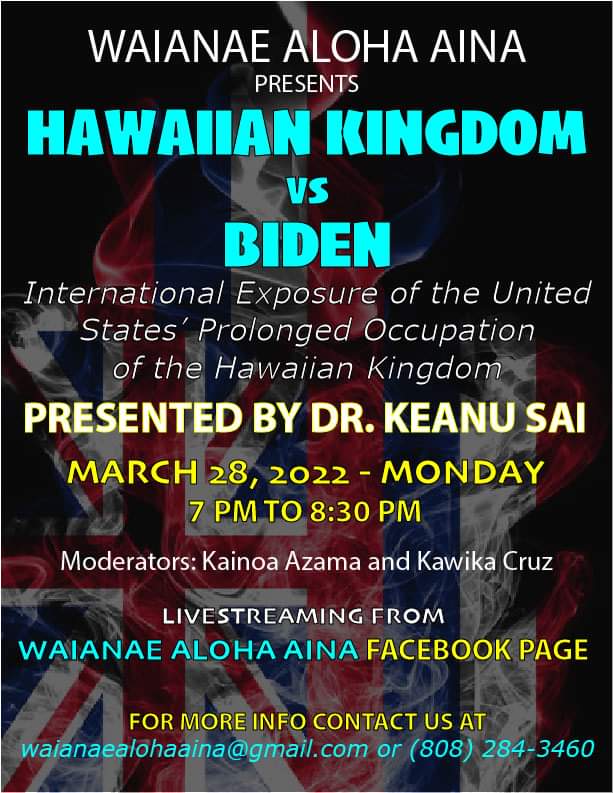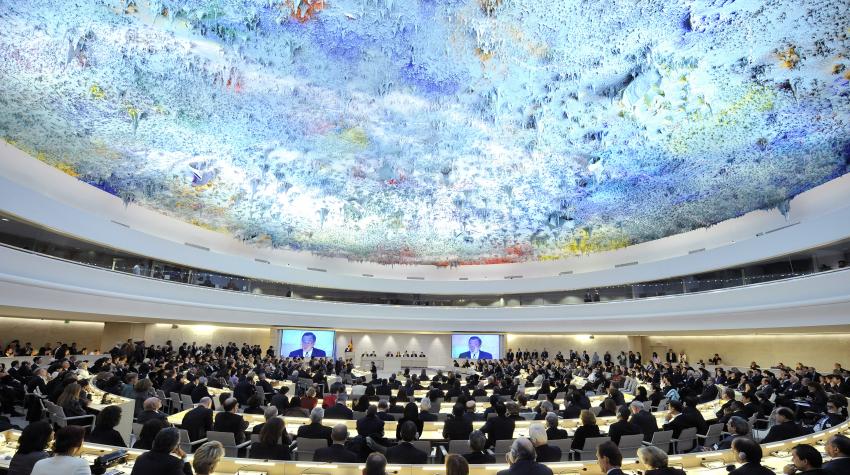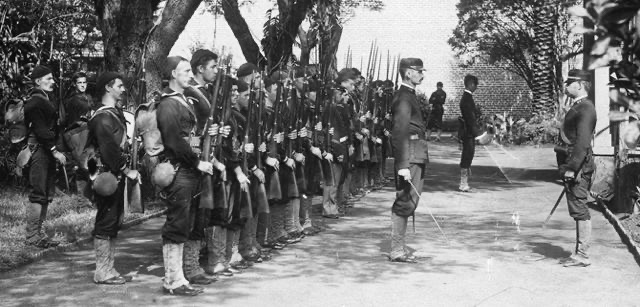
Wai‘anae Aloha ‘Āina Presents Hawaiian Kingdom v. Biden, Monday March 28
8



On March 21, 2022, the United Nations Human Rights Council (HRC) in Geneva, Switzerland, will be convening for its General Debate. On this day, Non-Government Organizations (NGOs) with accreditation to the United Nations Economic and Social Council will be delivering oral statements by video recording on situations that require the attention of the HRC. The public can view the General Debate online at the United Nations Web TV. Recordings will be uploaded the day after.

The International Association of Democratic Lawyers and the American Association of Jurists—Asociación Americana de Juristas (AAJ), both of whom are accredited NGOs, will be jointly sponsoring an oral statement to be delivered by Dr. Keanu Sai on the subject of the prolonged occupation of the Hawaiian Kingdom and the violation of human rights of Hawaiian subjects as a result of the unlawful imposition of American laws, being the war crime of usurpation of sovereignty, over the territory of the Hawaiian Kingdom for over a century. The IADL-AAJ have been assigned the 10th slot to deliver the oral statement on Monday.
The IADL and the AAJ uploaded the following information on the Hawaiian Kingdom’s prolonged occupation to accompany its oral statement: the PCA Case Repository of Larsen v. Hawaiian Kingdom (1999-2001), the National Lawyers Guild’s (NLG) Resolution on the prolonged occupation of the Hawaiian Kingdom (2019), the Position Statement by the NLG (2020), the ebook Royal Commission of Inquiry (2020), the NLG’s letter to State of Hawai‘i Governor David Ige (2020), the IADL resolution (2021), and a copy of the IADL-AAJ joint letter to the ambassadors accredited to the United Nations in New York City and Geneva (2022).
Russia’s invasion of Ukraine has highlighted certain rules or norms of international law. These rules of international law include the independence of countries or States that gives rise to sovereignty, which is defined as the “supreme, absolute, and uncontrollable power by which an independent state is governed.” The terms country and State are interchangeable. Ukraine became an independent State on August 24, 1991, after the breakup of the Soviet Union. The Hawaiian Kingdom became an independent State on November 28, 1843.
In the 1928 Island of Palmas case (Netherlands – United States of America), the sole-arbitrator, Max Huber, stated, “Sovereignty in the relations between States signifies independence. Independence in regard to a portion of the globe is the right to exercise therein, to the exclusion of any other State, the functions of a State.”
This rule springs another rule of international law, which is the duty of non-intervention by other States in a State’s internal affairs because of a State’s territorial integrity. These rules are foundational for the international system to operate, and because of this they are considered peremptory norms, also called jus cogens, that cannot be derogated or disparaged. To violate these rules is an internationally wrongful act.
When Russia invaded Ukraine it violated these rules of international law and transformed the state of affairs from a state of peace to a state of war. According to Judge Christopher Greenwood, “Traditional international law was based upon a rigid distinction between the state of peace and the state of war.” This separation provides the proper context by which certain rules of international law would or would not apply. The laws or war, which is also called international humanitarian law, are not applicable in a state of peace. Inherent in the rules of international humanitarian law is the co-existence of two States being that of the invading State and that of the invaded State.
War is regulated by international humanitarian law called the 1907 Hague Regulations, the 1949 Geneva Conventions, as well as customary international law. Since the latter part of the nineteenth century, violations of international humanitarian law could amount to war crimes, which are committed by individuals acting on behalf of a State and not by the government of the State as a whole. In the words of the International Military Tribunal, “crimes against international law are committed by men, not by abstract entities, and only by punishing individuals who commit such crimes can the provisions of international law be enforced.” War crimes have no statute of limitations.
While hostilities are taking place between Russian and Ukrainian forces there are certain rules of international humanitarian that would amount to war crimes committed against the civilian population. These war crimes include:
Intentionally directing attacks against the civilian population as such or against individual civilians not taking direct part in hostilities;
Intentionally directing attacks against civilian objects, that is, objects which are not military objectives;
Intentionally directing attacks against personnel, installations, material, units or vehicles involved in a humanitarian assistance or peacekeeping mission in accordance with the Charter of the United Nations, as long as they are entitled to the protection given to civilians or civilian objects under the international law of armed conflict; and
Intentionally launching an attack in the knowledge that such attack will cause incidental loss of life or injury to civilians or damage to civilian objects or widespread, long-term and severe damage to the natural environment which would be clearly excessive in relation to the concrete and direct overall military advantage anticipated.
It would appear from recent news coverage that Russian forces are committing war crimes against the civilian population of Ukraine who pose no threat to the invading forces. The Chief Prosecutor of the International Criminal Court (ICC) has recently launched an investigation of war crimes committed by Russian forces. The ICC Chief Prosecutor Karim Khan stated, “it is clear…directing attacks against civilians and civilian objects amounts to a war crime.” Although Russia and Ukraine are not State parties to the Rome Statute that would have authorized the ICC to investigate war crimes, the ICC was prompted to investigate by a referral of thirty-nine States that are State parties to the Rome Statute.
Should hostilities cease and certain portions of the territory of Ukraine should come under the effective control of Russian forces, international humanitarian law transforms the situation into belligerent occupation and the occupying State must continue to protect the civilian population who reside within the occupied territory. Should Russia be in effective control of territory, it will trigger the law of occupation where Russian forces are obligated to administer the laws of the Ukraine. This rule of international law would continue until the occupation comes to an end when Russian forces leave Ukrainian territory. As professor Ian Brownlie wrote:
Thus after the defeat of Nazi Germany in the Second World War the four major Allied powers assumed supreme power in Germany. The legal competence of the German state [its independence and sovereignty] did not, however, disappear. What occurred is akin to legal representation or agency of necessity. The German state continued to exist, and, indeed, the legal basis of the occupation depended on its continued existence.”
War crimes committed during belligerent occupation against the civilian population include what are called “grave breaches” that are listed under Article 147 of the 1949 Fourth Geneva Convention.
Grave breaches…shall be those involving any of the following acts, if committed against persons or property protected by the present Convention: wilful killing, torture or inhuman treatment, including biological experiments, wilfully causing great suffering or serious injury to body or health, unlawful deportation or transfer or unlawful confinement of a protected person, compelling a protected person to serve in the forces of a hostile Power, or wilfully depriving a protected person of the rights of fair and regular trial prescribed in the present Convention, taking of hostages and extensive destruction and appropriation of property, not justified by military necessity and carried out unlawfully and wantonly.
Along with the list of war crimes as “grave breaches,” there are war crimes that are listed under customary international law. In chapter three of the ebook Royal Commission of Inquiry: Investigating War Crimes and Human Rights Violations Committed in the Hawaiian Kingdom, Professor William Schabas provides a list of war crimes, under customary international law, committed in the Hawaiian Kingdom. These include:
war crime of usurpation of sovereignty during occupation;
war crime of compulsory enlistment;
war crime of denationalization;
war crime of pillage;
war crime of confiscation or destruction of property;
war crime of deprivation of fair and regular trial;
war crime of deporting civilians of the occupied territory; and
war crime of transferring populations into an occupied territory.

When United States forces invaded the Hawaiian Kingdom on January 16, 1893, they initiated the state of war between the United States and the Hawaiian Kingdom. Hostilities would only last until the following day when Queen Lili‘uokalani signed a conditional surrender to the United States. She stated:
I, Lili‘uokalani, by the Grace of God, and under the Constitution of the Hawaiian Kingdom, Queen, do hereby solemnly protest against any and all acts done against myself and the constitutional Government of the Hawaiian Kingdom by certain persons claiming to have established a Provisional Government of and for this Kingdom.
That I yield to the superior force of the United States of America whose Minister Plenipotentiary, His Excellency John L. Stevens, has caused United States troops to be landed at Honolulu and declared that he would support the said Provisional Government.
Now to avoid any collision of armed forces, and perhaps the loss of life, I do this under protest, and impelled by said force yield my authority until such time as the Government of the United States shall, upon facts being presented to it, undo the action of its representative and reinstate me in the authority which I claim as the constitutional sovereign of the Hawaiian Islands.
Done at Honolulu this 17th day of January, A.D. 1893.
Lili‘uokalani, R.
Samuel Parker, Minister of Foreign Affairs.
Wm. H. Cornwell, Minister of Finance.
John. F. Colburn, Minister of the Interior.
A.P. Peterson, Attorney General.
After completing an investigation, President Grover Cleveland notified the Congress:
And so it happened that on the 16th day of January, 1893, between four and five o’clock in the afternoon, a detachment of marines from the United States steamer, Boston, with two pieces of artillery, landed at Honolulu. The men, upwards of 160 in all, were supplied with double cartridge belts filled with ammunition and with haversacks and canteens, and were accompanied by a hospital corps with stretchers and medical supplies. This military demonstration upon the soil of Honolulu was of itself an act of war, unless made either with the consent of the Government of Hawaii or for the bona fide purpose of protecting the imperilled lives and property of citizens of the United States. But there is no pretense of any such consent on the part of the Government of the Queen, which at the time was undisputed and was both the de factor and the de jure government. In point of fact the existing government instead of requesting the presence of an armed force protested against it. There is little basis for the pretense that such forces were landed for the security of American life and property. If so, they would have been stationed in the vicinity of such property and so as to protect it, instead of at a distance and so as to command the Hawaiian Government building and palace. Admiral Skerrett, the officer in command of our naval force on the Pacific station, has frankly stated that in his opinion the location of the troops was inadvisable if they were landed for the protection of American citizens whose residences and places of business, as well as the legation and consulate, were in a distant part of the city, but the location selected was a wise one if the forces were landed for the purpose of supporting the provisional government. If any peril to life and property calling for any such martial array had existed, Great Britain and other foreign powers interested would not have been behind the United States in activity to protect their citizens. But they made no sign in that direction. When these armed men were landed, the city of Honolulu was in its customary orderly and peaceful condition. There was no symptom of riot or disturbance in any quarter. Men, women, and children were about the streets as usual, and nothing varied the ordinary routine or disturbed the ordinary tranquillity, except the landing of the Boston’s marines and their march through the town to the quarters assigned them. Indeed, the fact that after having called for the landing of the United States forces on the plea of danger to life and property the Committee of Safety themselves requested [US] Minister [John Stevens] to postpone action, exposed the untruthfulness of their representations of present peril to life and property. The peril they saw was an anticipation growing out of guilty intentions on their part and something which, though not then existing, they knew would certainly follow their attempt to overthrow the Government of the Queen without the aid of the United States forces.
From this date, the United States was in effective control of Hawaiian territory and international humanitarian law at the time obligated the United States to administer the laws of the Hawaiian Kingdom. Instead of complying with international humanitarian law, the United States unilaterally seized the Hawaiian Islands and transformed it into a military outpost to protect the United States from its adversaries. Since 1898, the United States has committed the war crime of “usurpation of sovereignty,” which is the unlawful imposition of American municipal laws over the territory of the Hawaiian Kingdom. This imposition of American laws is what caused the commission of the other war crimes identified by Professor Schabas.
Russian President Vladimir Putin claimed Russian troops were being sent into Ukraine to protect people who were subjected to bullying and genocide and that Russia was aiming for the “demilitarization and de-Nazification” of Ukraine. The BBC reported, “There has been no genocide in Ukraine: it is a vibrant democracy, led by a president who is Jewish.”
It would appear that Russia’s justification is not credible, just as the United States justification for the invasion of the Hawaiian Kingdom was not credible as well. The difference, however, is that President Cleveland, who was President of the invading force, completed a presidential investigation and acknowledged that the invasion was “illegal” under international law. Consequently, there is no need for an investigation into the invasion and unlawful overthrow of the Government of the Hawaiian Kingdom. Rather, the issue is the United States non-compliance with international humanitarian law for over a century, which has led to the commission of war crimes and human rights violations.
The restored government of the Hawaiian Kingdom, the Council of Regency, brought this to the attention by a diplomatic note to the foreign embassies accredited to the United Nations in New York City. This information was also brought to the attention of the foreign embassies in both New York City and Geneva by a joint letter from the International Association of Democratic Lawyers and the American Association of Jurists—Asociación Americana de Juristas, both of whom have consultative status with the United Nations Human Rights Council.
This past July 18, 2021, the General Synod of the United Church of Christ passed a resolution “Encouraging to End 128 years of War between the United States of America and the Hawaiian Kingdom.” The resolution was introduced by the Association of Hawaiian Evangelical Churches (AHEC). Pastor Wendell Davis is the head of AHEC as the Papa Makua.
AHEC is an association of 30 native Hawaiian protestant churches and 6 partnerships that include, as partnership ministries, the State Sunday School Association, Pacific Justice and Reconciliation, Kamehameha Schools, State Council of Hawaiian Congregational Churches, Christian Endeavor Hawai‘i, and the Pacific Islander & Asian American Ministries.
AHEC is a successor of the ‘Ahahui ‘Euanelio o Hawai‘i, also known as the Hawaiian Evangelical Association, that was established in 1854 in the Hawaiian Kingdom. Well known churches such as Kawaiaha‘o and Kaumakapili are members of AHEC. The resolution
“calls upon all settings of the church, denomination officers, conferences, associations, and congregations to live into the 1993 Apology of the United Church of Christ delivered to the Native Hawaiian people by President Paul Sherry.”
“call[s] upon the United Church of Christ’s General Counsel’s office to listen to and consider recommendations from the Association of Hawaiian Evangelical Churches, other Native Hawaiian organizations and Native Hawaiian voices drafting communications to local, national and international leaders and organizations calling for compliance with international humanitarian law and an end to the illegal occupation of the Hawaiian Islands.”
“reaffirm its commitment to stand alongside and in support of the efforts of Native Hawaiians to seek redress and restitution for the war crimes of the US against the Hawaiian Kingdom including, but not limited to, the crime of denationalization.”
In its first communication to local leaders, AHEC sent a certified letter to State of Hawai‘i Governor David Ige on February 23, 2022, stating:
[W]e support the National Lawyers Guild’s letter to you dated November 10, 2020, urging you, as Governor,
[T]o proclaim the transformation of the State of Hawai‘i and its Counties into an occupying government pursuant to the Council of Regency’s proclamation of June 3, 2019, in order to administer the laws of the Hawaiian Kingdom. This would include carrying into effect the Council of Regency’s proclamation of October 10, 2014 that bring the laws of the Hawaiian Kingdom in the nineteenth century up to date. We further urge you and other officials of the State of Hawai‘i and its Counties to familiarize yourselves with the contents of the recent eBook published by the [Royal Commission of Inquiry] and its reports that comprehensively explains the current situation of the Hawaiian Islands and the impact that international humanitarian law and human rights law have on the State of Hawai‘i and its inhabitants.